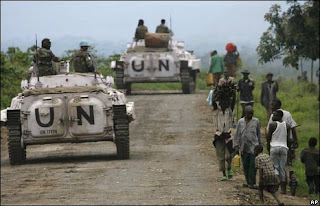
Those who have been watching American politics recently may have noted the appointment of Susan Rice as UN ambassador as well as the elevation of the post to cabinet level. This is significant for a number reasons but most pertinent for this committee is Ms. Rice's history of support for R2P.
Ms. Rice is young, yet has extensive experience as a national foreign policy advisor. Born out of her time in the Clinton administration, a defining position of Ms. Rice is the promise that she will not hesitate to push for immediate action on mass killings and genocide. Whereas in the past, the US has been reluctant to allow any compromises to sovereignty Rice has publicly said she will “[go] down in flames if that [is] required,” in order to ensure action such as that called for by the International Commission on Intervention and State Sovereignty in their authoritative report “The Responsibility to Protect”. Rice has been a very public champion of the use of the R2P norm with particular regard to the situation in Darfur, where it is likely she will continue to advise Mr. Obama to push for tougher sanctions, use the NATO air force to support the UN-AU force and lobby Congress to allow the use of force in the region.
Rice’s continued support of R2P reflects a changing understanding in the Obama administration of what R2P means and how it can be implemented effectively, in sharp contrast to the Bush administration who claimed they needed to protect the rights of Iraqi people as their reasoning behind invading. Now the US will be represented in the most prominent international organization, the UN, by Rice who has written extensively on R2P and has a much clearer comprehension of how the norm can and should be implemented. Hopefully, what Obama is signaling by this appointment is that the US will begin to use transform this norm from simply existing on paper into a powerful and effective tool to end serious crimes against humanity. Rice, who has commented that R2P is in jeopardy because of a lack of government will to implement it, is the ideal candidate to lead the global community in implementing R2P effectively.
Articles of interest:
The Evolution of Humanitarian Intervention and the Responsibility to Protect - Susan Rice
The Genocide in Darfur: America Must Do More to Fulfill the Responsibility to Protect - Susan Rice
Mass Suffering and Why We Look the Other Way - Article from the Washington Post on Obama's new administration and their approach to genocide as well as some insight into why Americans have cared so little in the past.
Background on Ms. Rice from the Washington Post
Preventing Genocide - Article from The Economist on Ms. Rice's appointment and the challenges facing the Obama administration.






